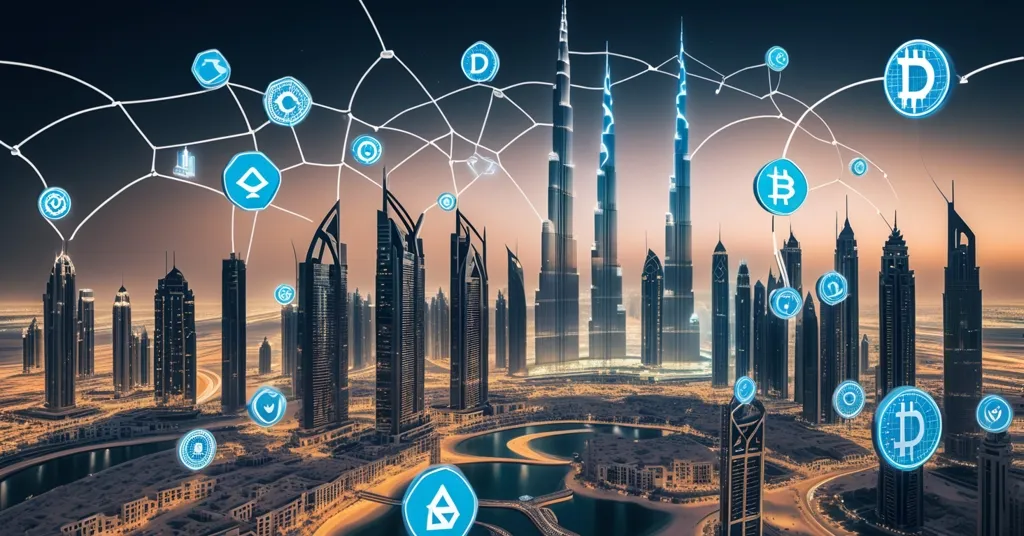Dubai’s Land and Crypto Regulators Join Forces to Transform Real Estate with Tokenization

Dubai’s Bold Move: Land and Crypto Regulators Unite to Revolutionize Real Estate
Dubai’s land and virtual assets regulators have signed a groundbreaking cooperation agreement to drive real estate tokenization and enhance the use of cryptocurrencies in property transactions. This initiative aims to integrate property tokenization with the real estate registry, aligning with Dubai’s ambitious strategies for economic and real estate development.
- Dubai Land Department (DLD) and Dubai Virtual Assets Regulatory Authority (VARA) sign cooperation deal
- Advance real estate tokenization and cryptocurrency use in property transactions
- Connected to a pilot project with the real estate registry
- Enhance market liquidity and property management efficiency
- Aligns with Dubai Real Estate Strategy 2033 and Dubai Economic Agenda D33
- Increase accessibility for small investors and sector growth
- VARA to require disclosure of major crypto holders
The Dubai Land Department (DLD) and the Dubai Virtual Assets Regulatory Authority (VARA) have joined forces to pave the way for real estate tokenization, which involves turning property ownership into digital tokens on a blockchain, allowing them to be traded like stocks. This strategic partnership aims to transform market dynamics and investor access, aligning with the Dubai Real Estate Strategy 2033 and the Dubai Economic Agenda D33 (D33). Helal Saeed Al Marri, Director-General of the Dubai Department of Economy and Tourism, emphasized the forward-thinking nature of this move:
The partnership reflects the ‘future-focused innovation,’ adding that partnership with the Dubai Virtual Assets Regulatory Authority aligns ‘with the objectives of the Dubai Real Estate Strategy 2033 and the Dubai Economic Agenda D33, which reinforce Dubai’s global leadership in one of the most vital sectors.’
The Initiative
Real estate tokenization is essentially about turning property rights into digital tokens on a blockchain, which can be bought, sold, or traded easily, much like stocks. This process could streamline transactions, reduce costs, and increase transparency. The Dubai Land Department (DLD) and the Dubai Virtual Assets Regulatory Authority (VARA) are collaborating to integrate this innovation with the real estate registry under the ‘REES Real Estate Innovation Initiative.’ This collaboration is part of Dubai’s broader vision to become a hub for real estate and virtual assets, leveraging blockchain technology to enhance efficiency and accessibility. For more information, you can visit Real Estate Tokenization Dubai wiki.
Benefits for Investors
By tokenizing property, Dubai aims to enhance market liquidity, allowing smaller investors to participate in a sector traditionally dominated by large players. This could open up new avenues for investment and potentially spur growth in the real estate market. The initiative could make real estate more accessible to small investors, enabling them to buy fractions of high-value properties with digital money, which could democratize the market and foster more inclusive economic participation. The impact of real estate tokenization on Dubai’s property market liquidity is expected to be significant.
Moreover, tokenization promises to streamline transactions, reducing the need for intermediaries and lowering costs. It also increases transparency by recording all transactions on a secure digital ledger, which can help prevent fraud and improve property management efficiency.
Regulatory Measures
To further enhance market transparency, VARA plans to require licensed crypto issuers and service providers to disclose major crypto holders, or “whales.” This move, as explained by Matthew White, VARA’s CEO, aims to combat market manipulation and build investor confidence:
The move could help investors better understand the products they are buying, as many tokens are controlled by third parties like venture capitalists.
VARA’s broader regulatory efforts extend beyond crypto whale disclosures to include requirements for asset issuers and crypto service providers to disclose reserve compositions and undergo independent audits. These measures are designed to prevent market crashes and boost investor confidence, demonstrating Dubai’s comprehensive approach to regulating virtual assets.
Challenges and Future Outlook
While this initiative is a significant step forward, it’s crucial to remain realistic about the challenges ahead. Tokenization and cryptocurrency integration are complex processes that require careful implementation to avoid pitfalls such as fraud and market manipulation. The legal structure for fractional ownership and digital assets is still evolving, and the DLD’s pilot project aims to pave the way for clearer regulations. The involvement of expert valuation services like Reliant Surveyors will be crucial in providing accurate valuations for tokenized assets, ensuring market confidence and stability.
Dubai’s real estate tokenization is expected to first impact luxury and residential properties, followed by commercial and retail spaces, and short-term rentals. This phased approach reflects the city’s diverse real estate market and its potential for tokenization across various segments.
While we’re excited about the potential of this initiative, we can’t ignore the risks. Market manipulation and the challenges of integrating new technology into existing systems are real concerns. But let’s not forget, Dubai isn’t just building skyscrapers; it’s building a skyscraper of digital innovation too! This move towards tokenization and increased transparency could serve as a model for other cities and countries looking to integrate blockchain technology into their economies. Discussions about the use of cryptocurrency in real estate transactions have been gaining traction across various platforms.
And while Bitcoin remains the gold standard of cryptocurrencies, initiatives like Dubai’s tokenization project show how altcoins and other blockchain technologies can fill unique niches in the financial revolution. No tolerance for scammers trying to pull a fast one on unsuspecting investors, but we’re all for innovations that disrupt the status quo and promote effective accelerationism. You can find more details on this cooperation on Reddit.
Key Takeaways and Questions
-
What is the goal of the cooperation between Dubai’s land and virtual assets regulators?
The goal is to advance real estate tokenization and improve the use of cryptocurrencies in property transactions, aiming to enhance market liquidity and property management efficiency.
-
How does this initiative align with Dubai’s broader strategies?
It aligns with the Dubai Real Estate Strategy 2033 and the Dubai Economic Agenda D33, reinforcing Dubai’s global leadership in real estate and virtual assets.
-
What potential benefits does the plan offer to small investors?
The plan could make real estate more accessible to small investors, potentially allowing them to participate in the market more easily.
-
Why is VARA planning to require disclosure of major crypto holders?
VARA aims to increase transparency in the crypto market, helping investors better understand the products they are buying, especially when many tokens are controlled by third parties like venture capitalists.
-
What are the potential risks and challenges of this initiative?
Risks include market manipulation, fraud, and the challenges of integrating new technology into existing systems.
-
How does this initiative fit into the broader crypto ecosystem?
While Bitcoin remains the gold standard, initiatives like Dubai’s tokenization project show how altcoins and other blockchain technologies can fill unique niches in the financial revolution.



